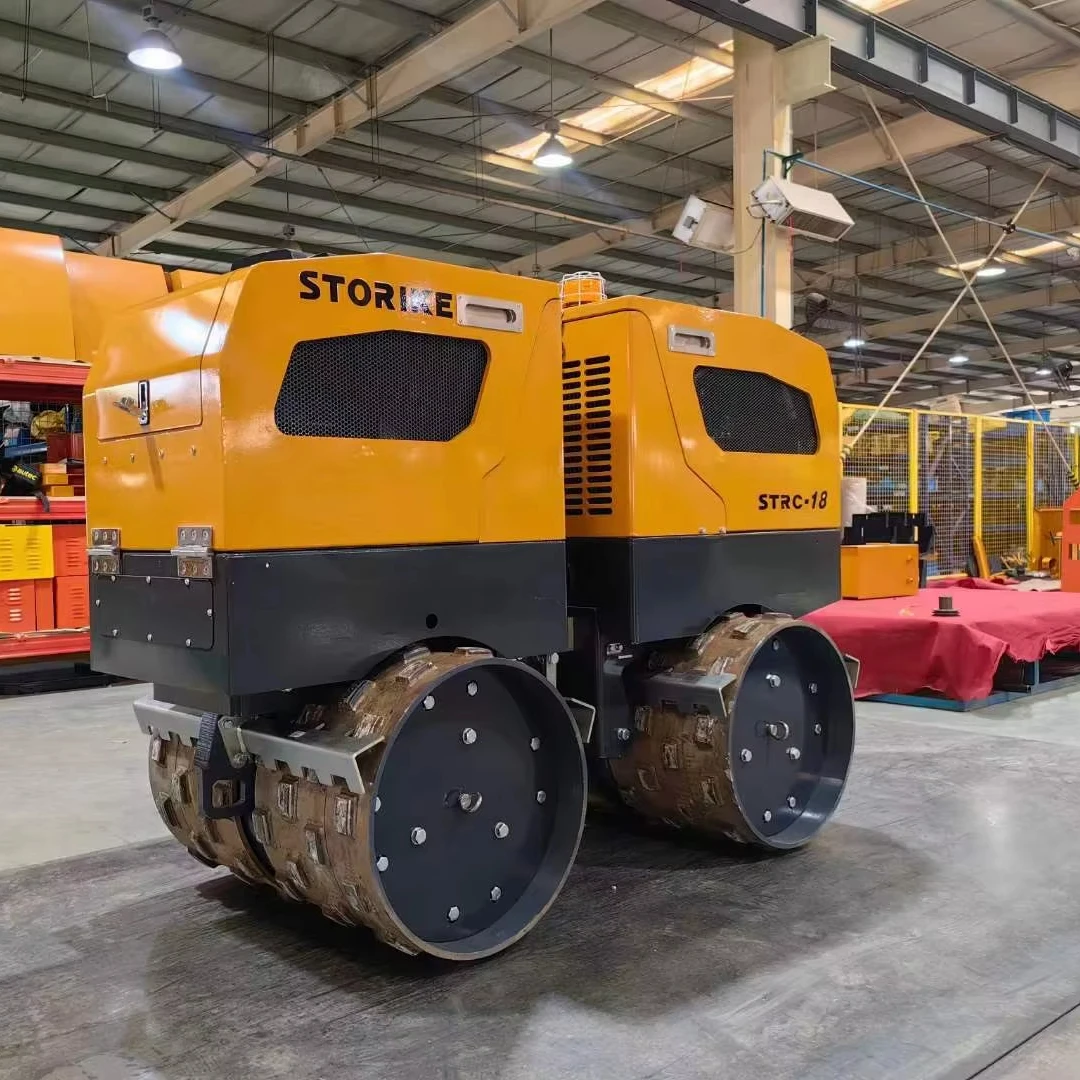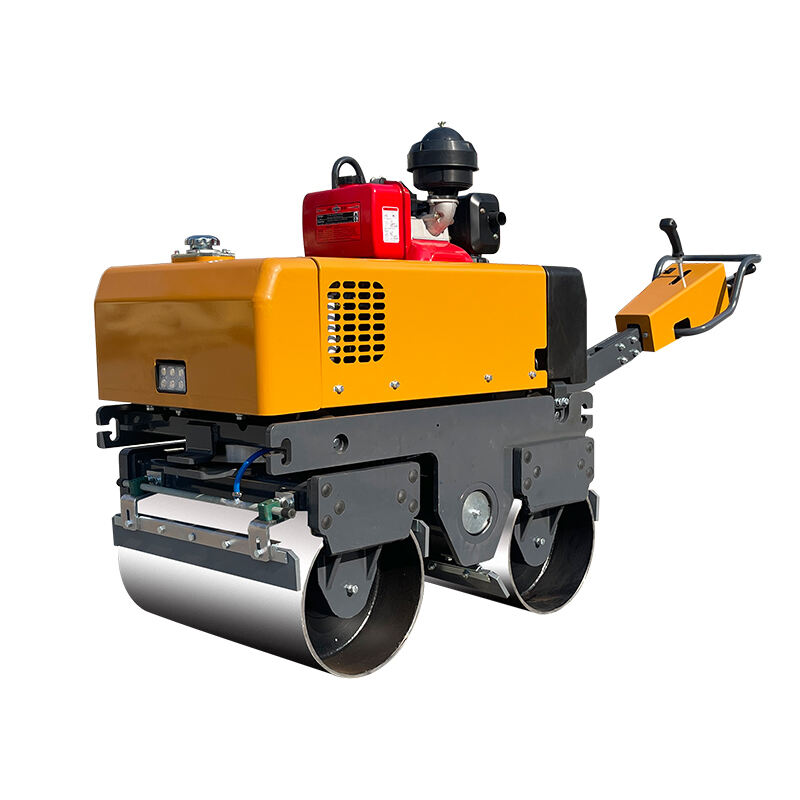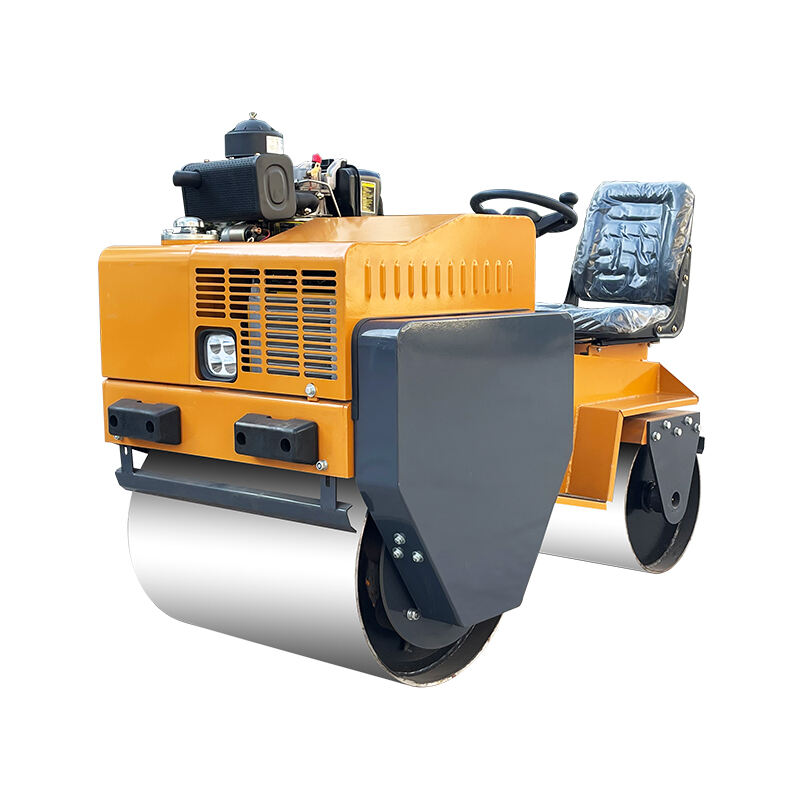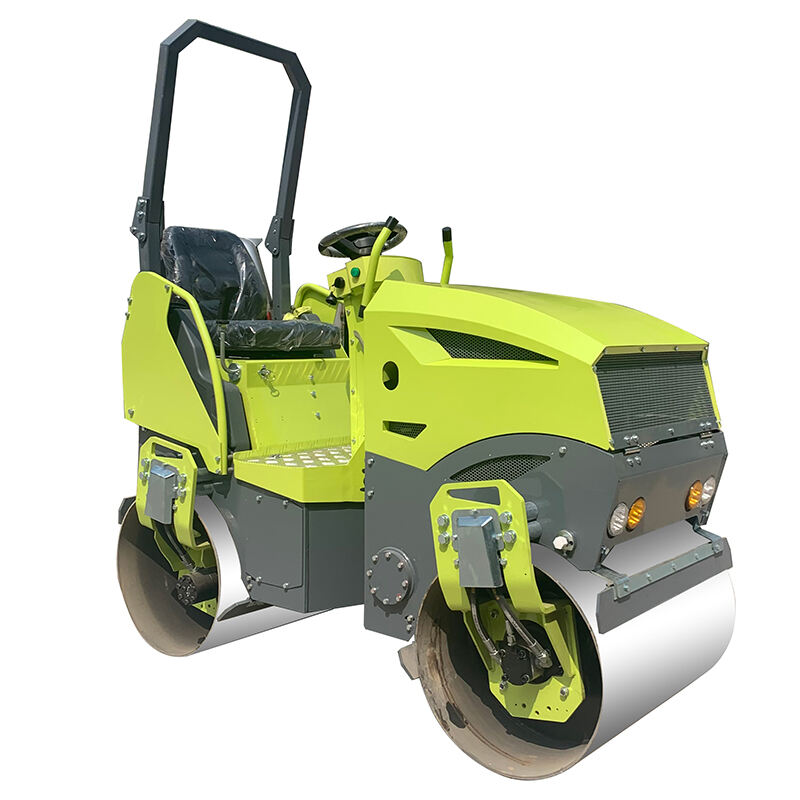دُهْنُ الطَّرِيق: فرش الطريق نحو طرق ناعمة ودائمة
أهمية مكابس الطرق في البنية التحتية الحديثة
تعزيز متانة الطرق من خلال الضغط
تجعل عملية الدك الجيدة كل الفرق من حيث قدرة الطرق على تحمل الأوزان ومقاومة الضرر الناتج عن مرور المركبات عليها يومًا بعد يوم. تُظهر الدراسات أن الطرق التي تتلقى دكًا مناسبًا أثناء البناء تميل إلى البقاء بحالة جيدة لفترة أطول بنسبة تقارب النصف مقارنة بالطرق التي لم يُنفذ فيها الدك بشكل صحيح. ما السبب في ذلك؟ تصبح الأسطح المُدكوكة جيدًا مواد أكثر كثافة لا تتدهور بسرعة تحت الضغط المستمر للحركة المرورية. وبالواقع، عندما تدوم الطرق لفترة أطول بين عمليات الإصلاح، فإن البلديات توفر المال على المدى الطويل. بدأت الحكومات المحلية في جميع أنحاء البلاد تدرك هذه الفائدة، حيث تلاحظ أن ميزانياتها الخاصة بالطرق تمتد لتشمل مزيدًا من الأعمال مع الحفاظ على اتصال المناطق دون حدوث اضطرابات متكررة بسبب أعمال الصيانة.
أنواع مكابس الطرق لمختلف التطبيقات
يُعد فهم أنواع المُدَكِّات المختلفة أمراً مهماً للغاية عند بناء الطرق. هناك ثلاثة أنواع رئيسية أساسية: المُدَكَّات الثابتة، والمُدَكَّات الاهتزازية، والمُدَكَّات ذات الإطارات الهوائية. كل نوع منها يكون الأكثر فعالية في مهام معينة اعتماداً على متطلبات الموقع. عادةً ما تكون النماذج الاهتزازية هي الخيار الأمثل لأعمال الأسفلت لأنها تقوم بتسوية السطح بشكل جيد. أما المُدَكَّات الإطارات فهي مزودة بإطارات مطاطية كبيرة يمكنها التعامل مع مختلف الظروف الأرضية دون إحداث تلف فيها. اختيار المعدات المناسبة يُحدث فرقاً حقيقياً في جودة الشكل النهائي للطريق وديمومته بمرور الوقت. يتبع معظم المقاولين إرشادات مُعَدَّة مسبقاً لتحديد المُدَكَّة المناسبة للمشاريع والنوع المحدد للتربة. تساعد هذه القواعد في الحفاظ على سير العمل بسلاسة وتحقيق جودة أفضل للطرق بشكل عام.
كيف تحقق مكابس الطرق ضغط الأسفلت الأمثل
العلم وراء تقنية الضغط الاهتزازي
تُعتبر المُدَكَّات الاهتزازية معداتٍ أساسيةً لتحقيق دَكٍّ جيّدٍ للأسفلت بفضل التكنولوجيا الاهتزازية الفريدة فيها. تعمل هذه الماكينات من خلال إرسال اهتزازاتٍ لأعلى ولأسفل وكذلك من جانبٍ إلى آخر، مما يُحكّ إطباق سطح الأسفلت. يعلم المقاولون من خبرتهم أن اختيار الإعدادات الصحيحة له أهمية كبيرة عند عملية الدَكّ. يهدف معظم المشغّلين إلى نطاقٍ يتراوح بين 2500 إلى 4500 اهتزازةٍ في الدقيقة، نظرًا لأن هذا النطاق عادةً ما يُزيل تلك الجيوب الهوائية المُزعجة في الخليط. يُعدّ التخلص من هذه الفجوات أمرًا مُختلفًا تمامًا في جودة الطريق. تبقى الطرق ذات الدَكّ الجيّد ناعمةً لفترةٍ أطول، ولا تظهر فيها الحُفر أو التشققات بسرعةٍ لأنها لا تحتوي على نقاط ضعفٍ يتسرب إليها الماء مُسبّبًا التلف بمرور الوقت.
الميزات الرئيسية للمكابس عالية الأداء
الدرافيل المُدمجة المصممة لأداء عالٍ تحتوي على مجموعة متنوعة من المزايا التي تجعلها تعمل بشكل أفضل وتُنتج نتائج ممتازة في الموقع. انظر إلى إعدادات السعة القابلة للتعديل إلى جانب خيارات التردد المزدوج، والتي تتيح للمُشغلين ضبط مستويات الدَّمك بدقة وفقًا لمتطلبات العمل الفعلية. كما أن الأنظمة الهيدروليكية في هذه الآلات متقدمة للغاية، مما يمنح العمال تحكمًا أفضل بكثير في الحركة، وفي الوقت نفسه تُنتج أسطحًا مُدمجة بشكل متسق طوال مدة العمل. يُعد الراحة عنصرًا مهمًا جدًا في تصميم هذه الآلات، لأن لا أحد يرغب في النظر بتركيز عبر رؤية ضعيفة أو التعامل مع تحكمات غير عملية لساعات طويلة متواصلة. يعرف المهنيون في قطاع البناء أن هذه المعدات تُحدث فرقًا كبيرًا في إنجاز المهام بشكل أسرع دون التفريط في معايير الجودة. ولهذا السبب نرى هذه الدرافيل الثقيلة تظهر في كل مكان، من مواقع بناء الطرق إلى مدرجات المطارات، حيث لم يعد الدَّمك المتسق خيارًا بل ضرورة.
أفضل نماذج مكابس الطرق للبناء الحديث
مكبس هيدروليكي قابل للانحناء بوزن 1.8 طن مع تحكم عن بعد
إن آلة التحميل الهيدروليكية المفصلية ذات التحكم عن بعد بسعة 1.8 طن تحدث ضجة في أوساط البناء بفضل هندسة ذكية إلى حد كبير. وبما أن حجمها مناسب تمامًا للمهام الصغيرة أو الأماكن الضيقة التي لا تستطيع الآلات الأكبر العمل بها، فإن هذه الآلة تؤدي بشكل مدهش حتى في الظروف الصعبة. ما يميزها حقًا هو نظام التحكم عن بعد. لم يعد المشغلين بحاجة إلى الوقوف بجانب الجهاز أثناء تشغيله، مما يقلل من الحوادث عندما تصبح الأجواء مغبرة أو تنخفض الرؤية. وهي مبنية بصلابة مع مكونات قوية داخلية، وقد بدأت هذه المكابس بالتفوق في المبيعات على النماذج الأقدم التي تتطلب وجود شخص على متنها أثناء التشغيل.
ماكينة دك أرضية بالاهتزاز اليدوية SVH80 بحمولة 800 كجم
تم تصميم الأسطوانة الاهتزازية المحمولة SVH80 بسعة 800 كجم مع هدف واحد في الاعتبار، ألا وهو إنجاز الأعمال بدقة في تلك الأماكن الصعبة والمرهقة. ورغم وزنها الذي يقارب 800 كيلوغرام، إلا أنها مبنية بجسم مدمج للغاية، مما يجعلها مثالية للمشاريع الصغيرة في طبقات الإسفلت حيث لا تستطيع الأسطوانات الكبيرة المرور عبر المداخل أو التنقل حول العقبات. وقد أفاد المقاولون الذين استخدموها بأنها تحقق نتائج جيدة حتى أثناء العمل لساعات طويلة متواصلة، وهو أمر لا تستطيع العديد من الموديلات المشابهة تقديمها. وبالنسبة للأشخاص الذين يسعون لتحقيق توازن بين جودة العمل والقيود المالية، فإن SVH80 توفر قيمة ممتازة مقابل السعر مقارنةً ببقية الخيارات المتاحة في السوق اليوم.
SVH70 Ride-On Double Drum Vibratory Roller
يتميز ممهدة الاهتزاز المزدوجة SVH70 ذات الجلوس بال_Configuration_ الفريد المزدوج الأسطوانة التي تعزز بشكل كبير كفاءة تعبئة المواد. صُمّمت هذه الآلة بهندسة متينة، وهي قادرة على التعامل مع المهام الصعبة في البناء يومًا بعد يوم مع تحقيق نتائج ممتازة في التماسك دون تعقيدات. كما يحب المشغلون العمل بها. فالمقعد مريح بدرجة كافية للورديات الطويلة، والضوابط منطقية تمامًا وتتيح للعاملين العودة إلى العمل بسرعة بدلًا من إضاعة الوقت في التعديلات. لقد شهدنا هذه الممهدات تعمل في شوارع المدن وتوسيع الطرق السريعة حيث تكون الجودة مهمة بامتياز. فهي توفر باستمرار نوع التماسك الكثيف الذي يجعل الطرق والأرصفة تدوم لفترة أطول، وتلبّي المواصفات الصارمة التي يطلبها المهندسون البلديون.
مكبس ST1200 المرتبط بوزن 1.2 طن
يعمل جهاز ST1200 Articulated 1.2 طن كومباكتور بشكل جيد للغاية على مشاريع البناء متوسطة الحجم التي ليست كبيرة جداً ولكنها تحتاج إلى معدات قوية. ما يميز هذا الجهاز عن غيره هو هيكله المفصلي الذي يمنح المشغلين تحكماً أفضل بكثير أثناء القيادة في الزوايا الضيقة أو الزوايا الصعبة التي لا تستطيع الكومباكتورات القياسية التعامل معها. تحب الطواقم البلدية استخدام هذا الطراز في إصلاح الطرق وصيانة الأرصفة لأنه قادر على التعامل مع جميع أنواع الأسطح بدءاً من الحصى وانتهاءً بالطين الرطب دون أن يفقد مساره. يميل المقاولون ذوو الخبرة الطويلة إلى التوصية بجهاز ST1200 كلما احتاج العملاء إلى معدة قوية بما يكفي لتتحمل الظروف الصعبة ولكنها دقيقة بما يكفي لإتمام المهمة بشكل صحيح من المرة الأولى.
اختيار الدرفلة الأسفلت المناسبة لمشروعك
العوامل التي يجب أخذها بعين الاعتبار: الوزن، تكوين الطبل والقوة
يعتمد اختيار المدحلة الأسفلتية المناسبة على عدة عوامل رئيسية تؤثر على أدائها في موقع العمل. يلعب وزن المدحلة دوراً كبيراً في جودة التماسك. بشكل عام، توفر الموديلات الأثقل قوة ضغط أكبر لبلوغ الكثافة المطلوبة. وقد أثبتت الاختبارات الميدانية مراراً وتكراراً أن أداء الطبقة الأسفلتية على المدى الطويل يرتبط ارتباطاً وثيقاً باستخدام الوزن المناسب للمدحلة. وتكمن الأهمية أيضاً في تكوين الأسطوانات. تكون المداحل ذات الأسطوانة الواحدة الأكثر فعالية في وضع الطبقة الأساسية من الأسفلت، في حين توفر المداحل المزدوجة ذات الأسطوانتين إنهاءً ناعماً إضافياً مطلوبًا للأسطح النهائية. هناك بعض المهام التي تتطلب استخدام أسطوانات متذبذبة عند العمل بالقرب من المنشآت الحساسة، حيث يمكن أن تسبب الاهتزازات العادية أضراراً غير مرغوب فيها. كما أن قوة المحرك تعتبر عاملاً مهماً بنفس القدر. تحتاج المشاريع الأكبر إلى آلات تمتلك قوة حصانية كافية للحفاظ على الاتساق عبر المساحات الكبيرة دون فقدان الكفاءة. ينصح معظم المقاولين الذين نتحدث إليهم بالنظر في نوع الحمولة المتوقعة قبل اختيار مواصفات المعدات، والتأكد من أن ما يتم اختياره قادر فعلياً على تحمل الظروف الواقعية دون أن تتعرض لعطل في منتصف المهمة.
مقارنة بين التحكم عن بعد والتشغيل اليدوي
عند اتخاذ قرار بين أنظمة التحكم عن بُعد أو التشغيل اليدوي التقليدي، فإن التأثير على سرعة إنجاز المهام وسلامة العمال يمكن أن يكون عاملاً حاسمًا في نجاح المشروع أو فشله. عادةً ما تؤدي الآلات المُدمجة في أنظمة التحكم عن بُعد إلى تقليل الحوادث بشكل ملحوظ، حيث لم يعد العمال يقفون بجانب الماكينات الثقيلة. فهم ببساطة يجلسون في مكان آمن ويديرون كل العمليات من هناك، مما يعني تقليل خطر تعرضهم للإصابات خلال الأيام الطويلة في الموقع. الشيء المثير للاهتمام هو أن هذه الأنظمة عن بُعد تسمح للعمال في الواقع بإدارة عدة آلات في وقت واحد، وبالتالي تقليل الوقت الضائع في الانتظار عندما تعطل آلة ما أو تحتاج إلى صيانة. من ناحية أخرى، ما زال العديد من الطواقم تفضل الاعتماد على الأنظمة اليدوية التقليدية لأنهم يشعرون بأنهم يمتلكون تحكمًا مباشرًا وواضحًا بما يحدث، بالإضافة إلى أن الصيانة تكون عادةً أكثر بساطة وأقل تكلفة في البداية. بالنظر إلى الأرقام من مواقع مختلفة، فإن العمليات التي تُجرى عن بُعد تُنهي المهام عادةً بشكل أسرع من العمليات اليدوية، ولكن ما إذا كانت توفر المال يعتمد بشكل كبير على حجم المشروع ومدى الميزانية المتوفرة. ومع ذلك، فإن معظم شركات الإنشاءات الكبرى تراهن بشكل كبير على التكنولوجيا عن بُعد في المستقبل، نظرًا لأنها لا تحمي سلامة العمال فحسب، بل تتماشى أيضًا بشكل أفضل مع اللوائح الجديدة التي تصدر كل عام بشأن معايير السلامة في مكان العمل.
نصائح الصيانة للحصول على أداء مستمر لمدحات الطرق
ممارسات العناية الأساسية بنظام الهيدروليك
إن الحفاظ على أنظمة الهيدروليك في حالة جيدة يوفر المال على المدى الطويل من خلال تجنب الأعطال المكلفة وتقليل الوقت الضائع عندما تكون الآلات مثل المدحلة الطرقية في حالة توقف. الأساسيات تشمل الانتباه إلى تسرب السوائل، واستبدال الخراطيم القديمة قبل أن تتعطل، والتأكد من تشحيم كل الأجزاء المتحركة بشكل صحيح. يحدد معظم مصنعي المعدات بدقة نوع السوائل التي يجب استخدامها ومواعيد الصيانة المطلوبة في الوقت الحالي. تميل شركات البناء التي تتبع هذه الإرشادات إلى ملاحظة أن آلياتها تدوم لفترة أطول مما هو متوقع. تشير بعض الدراسات إلى أن الصيانة الدورية يمكن أن تمدد عمر المعدات بنسبة تصل إلى 20%، مما يحقق وفورات حقيقية للشركات التي تعتمد بشكل كبير على أسطولها من المداحل المدمجة في أعمالها اليومية.
صيانة موسمية لتوافق جودة الحفارات ذات الدفع الرباعي
الحفاظ على مداحل الطرق في حالة جيدة، خاصةً عند استخدامها مع رافعات التوجيه الانزلاقي، يتطلب التعامل مع مشاكل مختلفة على مدار الفصول. مع حلول فصل الشتاء، يصبح فحص مستويات سائل التبريد والتأكد من قوة البطاريات أمرًا بالغ الأهمية لتشغيل هذه الآلات في الصباحات الباردة. يأتي الصيف مصحوبًا بمشاكله الخاصة - الانتباه إلى مشاكل نظام التبريد قبل أن تبدأ المحركات بالعمل بشكل ساخن تحت أشعة الشمس. يُؤكد معظم المشغلين ذوي الخبرة على أهمية وجود قوائم تحقق منفصلة لكل موسم حتى لا يُغفل أي شيء أثناء فحوصات الصيانة الدورية. يدرك المحترفون أن اكتشاف علامات التآكل الصغيرة مبكرًا يمكن أن يوفر الكثير من المال لاحقًا مع إطالة عمر المعدات بشكل عام. القليل من العناية الإضافية يُسهم بشكل كبير في الحفاظ على أداء كل من مداحل الطرق والرافعات التوجيه الانزلاقي بشكل موثوق بغض النظر عن الظروف الجوية التي تظهر في مواقع العمل.
 EN
EN
 AR
AR CS
CS DA
DA NL
NL FI
FI FR
FR DE
DE IT
IT NO
NO KO
KO PL
PL PT
PT RO
RO RU
RU ES
ES SV
SV TL
TL ID
ID LV
LV SR
SR SK
SK SL
SL VI
VI SQ
SQ ET
ET TH
TH TR
TR AF
AF MS
MS GA
GA HY
HY KA
KA BS
BS LA
LA MN
MN MY
MY KK
KK UZ
UZ KY
KY











